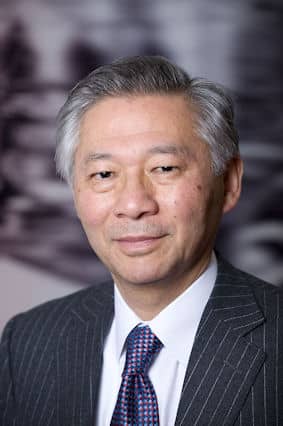


Professor George Yip
George Yip is Dean of the Rotterdam School of Management Erasmus University. RSM is a top-ranked international business school renowned for its ground-breaking research in sustainable business practice and for the development of leaders in global business. Offering an array of bachelor, master, ...
About George Yip
George Yip is Dean of the Rotterdam School of Management Erasmus University. RSM is a top-ranked international business school renowned for its ground-breaking research in sustainable business practice and for the development of leaders in global business. Offering an array of bachelor, master, doctoral, MBA and executive education programmes, RSM is consistently ranked amongst the top 10 business schools in Europe. Yip is also a Fellow of the Advanced Institute of Management Research, which is the UK’s research initiative on management (www.aimresearch.org), and a Fellow of the Academy of International Business.
He is one of the world’s leading authorities on global strategy and marketing, managing global customers, and internationalization. His current research concerns management innovation, strategic transformation, international competitiveness, and global customers.
George has talked to top management groups and forums all over the world, including for ABN Amro, American Express, Arab-Malaysian Bank, Arch Coal, Arup, Bank of America, BASF, Beiersdorf, Bertelsmann, Brown-Forman, Carl Zeiss, Cleanaway, Coopers & Lybrand, Deloitte Touche Tohmatsu, Delta Airlines, Deutsche Bank, Du Pont, Ernst & Young, IBM, Invensys, J-Phone (Japan), McKinsey, KPMG, Massachusetts Financial Services, Milliken, National Australia Bank, Nestlé, Nissan, Nokia, Philips, Peoplesoft, Pitney Bowes, Pricewaterhouse Coopers, Ralston-Purina, San Miguel, SAP, Sara Lee, Saudi Basic Industries Company, Singapore Airlines, Sony, Spirent, and ST Microelectronics; and for conferences held by Business Week, Far Eastern Economic Review, Forbes, Fortune, and the World Economic Forum. He has won both “best teaching” and “best research” awards.
Before joining RSM Erasmus University, Yip was Vice President and Director of Research & Innovation at Capgemini Consulting, an 8 billion euro global company active in consulting, technology, and outsourcing, where he managed the research and innovation process to develop thought leadership for the company. During this time he was on leave of absence as Professor of Strategic and International Management at London Business School. He was previously the Chair of Marketing and Strategy at Cambridge University, and has also held faculty positions at Harvard Business School and UCLA, and visiting positions at China-Europe International Business School, Georgetown University, Stanford Business School, and Templeton College-Oxford.
George has twelve years of full-time business experience in international business, marketing, and strategy, working in the United States and the United Kingdom. This experience includes product management with Unilever; account management with Lintas, one of the world’s largest advertising agencies; and senior manager of Price Waterhouse’s strategic management consulting services in the Eastern United States.
His latest book is Managing Global Customers (Oxford University Press, 2007). An earlier book, Total Global Strategy: Managing for Worldwide Competitive Advantage (Prentice Hall, 1992; 1995) was selected as one of the 30 best business books of 1992; has been published in ten languages, and updated as Total Global Strategy II (2003). Other books include Asian Advantage: Key Strategies for Winning in the Asia-Pacific Region (Addison Wesley/Perseus Books, 1998 and updated edition 2000) and Strategies for Central and Eastern Europe (Macmillan Business, 2000), and Barriers to Entry: A Corporate Strategy Perspective. He has published articles on strategy and marketing in Business Horizons, Business & Strategy, Business Strategy Review, California Management Review, Chief Executive, Columbia Journal of World Business, Global Executive, Harvard Business Review, International Business Review, International Marketing Review, Journal of Business Strategy, Journal of International Management, Journal of International Marketing, Long Range Planning, Management International Review, Planning Review, Sloan Management Review, Strategic Management Journal, and The International Executive.
He holds B.A. and M.A. degrees in economics from Cambridge University; and an MBA and doctorate from Harvard Business School. A native of Asia, he is a dual citizen of the United Kingdom and of the United States.
Global Strategy
In the era of globalization, multinational companies can no longer develop strategies on a country-by-country basis. In his pioneering book, Total Global Strategy, George Yip provided a framework for how companies can develop globally integrated strategies to build worldwide competitive advantage. This talk is based on that book and Yip’s extensive research program conducted over the last ten years on multinational companies’ use of global strategy. The talk covers current globalization trends, plus a systematic, comprehensive, balanced, and practical approach to developing a global strategy:
– Diagnosing industry globalization potential
– Achieving global market participation
– Designing global products and service
– Locating global activities
– Creating global marketing
– Making global competitive moves
– Building the global organization
Yip provides dozens of examples from American, European and Asian companies on the successful and not so successful use of global strategies.
Managing Global Customers
In this talk, George Yip addresses one of the hottest topics in international business: managing global customers. Multinational companies no longer buy on a country-by-country basis, but increasingly on a global basis. These customers seek global contracts, standardized terms and conditions, and uniform products, services and prices. Managing these customers places new demands on multinational suppliers. So the latter increasingly use a variety of management techniques for co-ordinating their activities with multinational customers.
The talk provides a systematic framework for developing and implementing global customer management programs. It draws on in-depth research at over 20 major U.S. and European multinational companies. The audience will learn how to
– Think about managing global customers in the context of their overall global strategy
– Develop effective global customer management programs
– Overcome barriers to implementation and success
– Build better relationships with important customers
– Get the entire company to engage with managing global customers
The talk is based on the speaker’s new book, Managing Global Customers, published by Oxford University Press in 2007 and also an article in Harvard Business Review (September 2007).
Build Traditions for Strategic Transformation
Strategic transformation has been a high corporate priority for the last 20 years. But very few companies manage to transform themselves before they are forced to by financial crises. The ideal, of course, is to maintain long-term superior financial performance while undertaking the necessary strategic transformations that sustain that performance. We set out to learn whether any companies have pulled off this magic double trick and how they did it. We investigated 215 of the largest publicly listed British companies. We found that only 28 (or 13% of the 215) achieved consistently superior financial performance over the 20 years from 1984 to 2003. Then of these 28, only four (fewer than 2% of the 215) also achieved successful strategic transformation. We carried out interviews with 46 senior executives, tracing back management processes for over 40 years in three of these four ”successful strategic transformers” (SSTs), pairing them with three comparator companies, to understand how they did it. We found that the SSTs developed four historical traditions over a 40 year or longer period, each of which contributed to the companies’ ability for strategic transformation. These traditions are those of continuity, anticipation, contestability, and mobility.
This talk explains these traditions and how other companies might develop them.
